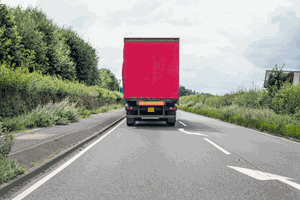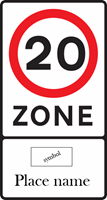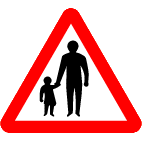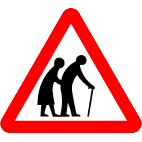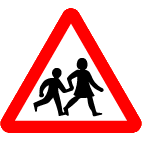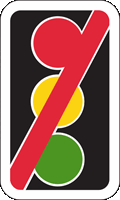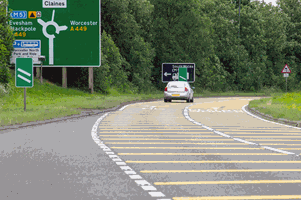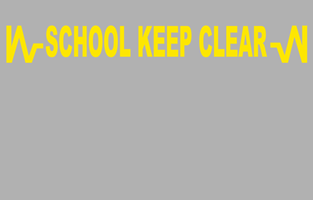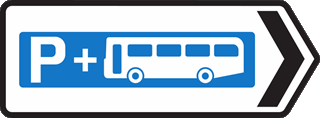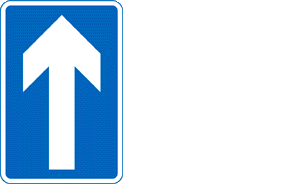You have 57 minutes to answer 50 multiple choice theory test questions. You need to answer at least 43 out of 50 questions correctly to pass. You can review your answer after each question or you can review all of your answers at the end of the test. Best of luck!
Test Quick View
Click on an answer to view the correct choice along with the explanation.
Correct Answer: D
Explanation: Staying back will increase your view of the road ahead. This will help you to see any hazards that might occur and allow you more time to react.
Explanation: Staying back will increase your view of the road ahead. This will help you to see any hazards that might occur and allow you more time to react.
2. You are turning left at a junction. Pedestrians have started to cross the road. You should
Mark one answer
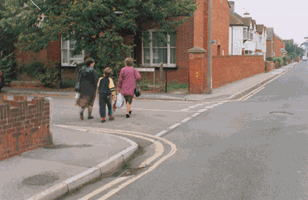
B
C
D
Correct Answer: B
Explanation: If you're turning into a side road, pedestrians already crossing the road have priority and you should give way to them. Don't wave them across the road, sound your horn, flash your lights or give any other misleading signal. Other road users may misinterpret your signal and this may lead the pedestrians into a dangerous situation. If a pedestrian is slow or indecisive be patient and wait. Don't hurry them across by revving your engine.
Explanation: If you're turning into a side road, pedestrians already crossing the road have priority and you should give way to them. Don't wave them across the road, sound your horn, flash your lights or give any other misleading signal. Other road users may misinterpret your signal and this may lead the pedestrians into a dangerous situation. If a pedestrian is slow or indecisive be patient and wait. Don't hurry them across by revving your engine.
3. You are at a road junction, turning into a minor road. There are pedestrians crossing the minor road. You should
Mark one answer
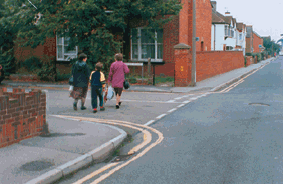
B
C
D
Correct Answer: B
Explanation: Always look into the road into which you are turning. If there are pedestrians crossing, give way to them, but don't wave or signal to them to cross. Signal your intention to turn as you approach.
Explanation: Always look into the road into which you are turning. If there are pedestrians crossing, give way to them, but don't wave or signal to them to cross. Signal your intention to turn as you approach.
Correct Answer: A
Explanation: Toucan crossings are shared by pedestrians and cyclists and they are shown the green light together. Cyclists are permitted to cycle across. The signals are push-button operated and there is no flashing amber phase.
Explanation: Toucan crossings are shared by pedestrians and cyclists and they are shown the green light together. Cyclists are permitted to cycle across. The signals are push-button operated and there is no flashing amber phase.
5. You see a pedestrian with a white stick and red band. This means that the person is
Mark one answer
B
C
D
Correct Answer: B
Explanation: If someone is deaf as well as blind, they may be carrying a white stick with a red reflective band. You can't see if a pedestrian is deaf. Don't assume everyone can hear you approaching.
Explanation: If someone is deaf as well as blind, they may be carrying a white stick with a red reflective band. You can't see if a pedestrian is deaf. Don't assume everyone can hear you approaching.
6. You are coming up to a roundabout. A cyclist is signalling to turn right. What should you do?
Mark one answer
B
C
D
Correct Answer: B
Explanation: If you're following a cyclist who's signalling to turn right at a roundabout leave plenty of room. Give them space and time to get into the correct lane.
Explanation: If you're following a cyclist who's signalling to turn right at a roundabout leave plenty of room. Give them space and time to get into the correct lane.
Correct Answer: A
Explanation: The presence of street lights generally shows that there is a 30 mph speed limit, unless signs tell you otherwise.
Explanation: The presence of street lights generally shows that there is a 30 mph speed limit, unless signs tell you otherwise.
Correct Answer: B
Explanation: If you're in places where there are likely to be pedestrians such as outside schools, near parks, residential areas and shopping areas, you should be extra-cautious and keep your speed down. Many local authorities have taken measures to slow traffic down by creating traffic calming measures such as speed humps. They are there for a reason; slow down.
Explanation: If you're in places where there are likely to be pedestrians such as outside schools, near parks, residential areas and shopping areas, you should be extra-cautious and keep your speed down. Many local authorities have taken measures to slow traffic down by creating traffic calming measures such as speed humps. They are there for a reason; slow down.
Correct Answer: A
Explanation: When you pass pedestrians in the road, leave plenty of room. You might have to use the right-hand side of the road, so look well ahead, as well as in your mirrors, before pulling out. Take great care if there is a bend in the road obscuring your view ahead.
Explanation: When you pass pedestrians in the road, leave plenty of room. You might have to use the right-hand side of the road, so look well ahead, as well as in your mirrors, before pulling out. Take great care if there is a bend in the road obscuring your view ahead.
Correct Answer: C
Explanation: Some crossings have gates but no attendant or signals. You should stop, look both ways, listen and make sure that there is no train approaching. If there is a telephone, contact the signal operator to make sure that it's safe to cross.
Explanation: Some crossings have gates but no attendant or signals. You should stop, look both ways, listen and make sure that there is no train approaching. If there is a telephone, contact the signal operator to make sure that it's safe to cross.
Correct Answer: A
Explanation: When traffic lights are out of order you should treat the junction as an unmarked crossroads. Be cautious as you may need to give way or stop. Keep a look out for traffic attempting to cross the junction at speed.
Explanation: When traffic lights are out of order you should treat the junction as an unmarked crossroads. Be cautious as you may need to give way or stop. Keep a look out for traffic attempting to cross the junction at speed.
12. You see a car on the hard shoulder of a motorway with a HELP pennant displayed. This means the driver is most likely to be
Mark one answer
B
C
D
Correct Answer: A
Explanation: If a disabled driver's vehicle breaks down and they are unable to walk to an emergency phone, they are advised to stay in their car and switch on the hazard warning lights. They may also display a 'Help' pennant in their vehicle.
Explanation: If a disabled driver's vehicle breaks down and they are unable to walk to an emergency phone, they are advised to stay in their car and switch on the hazard warning lights. They may also display a 'Help' pennant in their vehicle.
Correct Answer: C
Explanation: Traffic calming measures are used to make the roads safer for vulnerable road users, such as cyclists, pedestrians and children. These can be designed as chicanes, road humps or other obstacles that encourage drivers and riders to slow down.
Explanation: Traffic calming measures are used to make the roads safer for vulnerable road users, such as cyclists, pedestrians and children. These can be designed as chicanes, road humps or other obstacles that encourage drivers and riders to slow down.
Correct Answer: A
Explanation: When traffic lights are out of order treat the junction as an unmarked crossroad. Be very careful as no one has priority and be prepared to stop.
Explanation: When traffic lights are out of order treat the junction as an unmarked crossroad. Be very careful as no one has priority and be prepared to stop.
15. You are going along a street with parked vehicles on the left-hand side. For which THREE reasons should you keep your speed down?
Mark three answers
B
C
D
E
Correct Answer: A, B, D
Explanation: Travel slowly and carefully where there are parked vehicles in a built-up area. Beware of
- vehicles pulling out, especially bicycles and other motorcycles,
- pedestrians, especially children, who may run out from between cars,
- drivers opening their doors.
Explanation: Travel slowly and carefully where there are parked vehicles in a built-up area. Beware of
- vehicles pulling out, especially bicycles and other motorcycles,
- pedestrians, especially children, who may run out from between cars,
- drivers opening their doors.
Correct Answer: B
Explanation: Accelerating and braking gently and smoothly will help to save fuel, reduce wear on your vehicle and is better for the environment.
Explanation: Accelerating and braking gently and smoothly will help to save fuel, reduce wear on your vehicle and is better for the environment.
B
C
D
Correct Answer: B
Explanation: While the pedestrians are crossing don't encourage them to cross by waving or flashing your headlights: other road users may misunderstand your signal. Don't harass them by creeping forward or revving your engine.
Explanation: While the pedestrians are crossing don't encourage them to cross by waving or flashing your headlights: other road users may misunderstand your signal. Don't harass them by creeping forward or revving your engine.
Correct Answer: B
Explanation: These lines may be painted on the road on the approach to a roundabout, village or a particular hazard. The lines are raised and painted yellow and their purpose is to make you aware of your speed. Reduce your speed in good time so that you avoid having to brake harshly over the last few metres before reaching the junction.
Explanation: These lines may be painted on the road on the approach to a roundabout, village or a particular hazard. The lines are raised and painted yellow and their purpose is to make you aware of your speed. Reduce your speed in good time so that you avoid having to brake harshly over the last few metres before reaching the junction.

B
C
D
Correct Answer: C
Explanation: Yellow 'box junctions' like this are often used where it's busy. Their purpose is to keep the junction clear for crossing traffic. Don't enter the painted area unless your exit is clear. The exception to this is when you are turning right and are only prevented from doing so by oncoming traffic or by other vehicles waiting to turn right.
Explanation: Yellow 'box junctions' like this are often used where it's busy. Their purpose is to keep the junction clear for crossing traffic. Don't enter the painted area unless your exit is clear. The exception to this is when you are turning right and are only prevented from doing so by oncoming traffic or by other vehicles waiting to turn right.
20. What is the reason for the area marked in red and white along the centre of this road?
Mark one answer
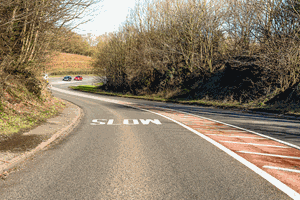
B
C
D
Correct Answer: C
Explanation: Areas of 'hatched markings' such as these are to separate traffic streams which could be a danger to each other. They are often seen on bends or where the road becomes narrow. If the area is bordered by a solid white line, you must not enter it except in an emergency.
Explanation: Areas of 'hatched markings' such as these are to separate traffic streams which could be a danger to each other. They are often seen on bends or where the road becomes narrow. If the area is bordered by a solid white line, you must not enter it except in an emergency.
Correct Answer: A
Explanation: These markings are found on the road outside schools. DO NOT stop (even to set down or pick up children) or park on them. The markings are to make sure that drivers, riders, children and other pedestrians have a clear view.
Explanation: These markings are found on the road outside schools. DO NOT stop (even to set down or pick up children) or park on them. The markings are to make sure that drivers, riders, children and other pedestrians have a clear view.
Correct Answer: A, C, D, E
Explanation: Learner car drivers and motorcyclists are not allowed on the motorway until they have passed their practical test.Motorways have rules that you need to know before you venture out for the first time. When you've passed your practical test it's a good idea to have some lessons on motorways. Check with your instructor about this.
Explanation: Learner car drivers and motorcyclists are not allowed on the motorway until they have passed their practical test.Motorways have rules that you need to know before you venture out for the first time. When you've passed your practical test it's a good idea to have some lessons on motorways. Check with your instructor about this.
Correct Answer: A
Explanation: To ease the congestion in town centres, some cities and towns provide park-and-ride schemes. These allow you to park in a designated area and ride by bus into the centre. Park-and-ride schemes are usually cheaper and easier than car parking in the town centre.
Explanation: To ease the congestion in town centres, some cities and towns provide park-and-ride schemes. These allow you to park in a designated area and ride by bus into the centre. Park-and-ride schemes are usually cheaper and easier than car parking in the town centre.
24. It can help to plan your route before starting a journey. Why should you also plan an alternative route?
Mark one answer
B
C
D
Correct Answer: D
Explanation: It can be frustrating and worrying to find your planned route is blocked by roadworks or diversions. If you have planned an alternative you will feel less stressed and more able to concentrate fully on your driving or riding. If your original route is mostly on motorways it's a good idea to plan an alternative using non-motorway roads. Always carry a map with you just in case you need to refer to it.
Explanation: It can be frustrating and worrying to find your planned route is blocked by roadworks or diversions. If you have planned an alternative you will feel less stressed and more able to concentrate fully on your driving or riding. If your original route is mostly on motorways it's a good idea to plan an alternative using non-motorway roads. Always carry a map with you just in case you need to refer to it.
Correct Answer: D
Explanation: Congestion can be reduced by keeping traffic at a constant speed. At busy times maximum speed limits are displayed on overhead gantries. These can be varied quickly depending on the amount of traffic. By keeping to a constant speed on busy sections of motorway overall journey times are normally improved.
Explanation: Congestion can be reduced by keeping traffic at a constant speed. At busy times maximum speed limits are displayed on overhead gantries. These can be varied quickly depending on the amount of traffic. By keeping to a constant speed on busy sections of motorway overall journey times are normally improved.
26. You are on a dual carriageway. Ahead you see a vehicle with an amber flashing light. What could this be?
Mark one answer
B
C
D
Correct Answer: A
Explanation: An amber flashing light on a vehicle indicates that it is slow-moving. Battery powered vehicles used by disabled people are limited to 8 mph. It's not advisable for them to be used on dual carriageways where the speed limit exceeds 50 mph. If they are then an amber flashing light must be used.
Explanation: An amber flashing light on a vehicle indicates that it is slow-moving. Battery powered vehicles used by disabled people are limited to 8 mph. It's not advisable for them to be used on dual carriageways where the speed limit exceeds 50 mph. If they are then an amber flashing light must be used.
27. You are travelling on a motorway. Unless signs show a lower speed limit you must NOT exceed
Mark one answer
B
C
D
Correct Answer: C
Explanation: The national speed limit for a car or motorcycle on the motorway is 70 mph. Lower speed limits may be in force, for example at roadworks, so look out for the signs. Variable speed limits operate in some areas to control very busy stretches of motorway. The speed limit may change depending on the volume of traffic.
Explanation: The national speed limit for a car or motorcycle on the motorway is 70 mph. Lower speed limits may be in force, for example at roadworks, so look out for the signs. Variable speed limits operate in some areas to control very busy stretches of motorway. The speed limit may change depending on the volume of traffic.
28. Your vehicle needs a current MOT certificate. Until you have one you will NOT be able to
Mark one answer
B
C
D
Correct Answer: D
Explanation: If your vehicle is required to have an MOT certificate, you will need to make sure this is current before you are able to renew your vehicle excise licence (road tax). You can renew online, by phone or at certain post offices.
Explanation: If your vehicle is required to have an MOT certificate, you will need to make sure this is current before you are able to renew your vehicle excise licence (road tax). You can renew online, by phone or at certain post offices.
B
C
D
Correct Answer: D
Explanation: If someone has been injured, the sooner proper medical attention is given the better. Send someone to phone for help or go yourself. An injured person should only be moved if they're in further danger. An injured motorcyclist's helmet should NOT be removed unless it is essential.
Explanation: If someone has been injured, the sooner proper medical attention is given the better. Send someone to phone for help or go yourself. An injured person should only be moved if they're in further danger. An injured motorcyclist's helmet should NOT be removed unless it is essential.
Correct Answer: A
Explanation: In a one-way system traffic may be passing you on either side. Always be aware of all traffic signs and understand their meaning. Look well ahead and react to them in good time.
Explanation: In a one-way system traffic may be passing you on either side. Always be aware of all traffic signs and understand their meaning. Look well ahead and react to them in good time.
B
C
D
Correct Answer: C
Explanation: Stay with the casualty and talk to them quietly and firmly to calm and reassure them. Avoid moving them unnecessarily in case they are injured. Keep them warm, but don't give them anything to eat or drink.
Explanation: Stay with the casualty and talk to them quietly and firmly to calm and reassure them. Avoid moving them unnecessarily in case they are injured. Keep them warm, but don't give them anything to eat or drink.
32. You arrive at an incident. There has been an engine fire and someone's hands and arms have been burnt. You should NOT
Mark one answer
B
C
D
Correct Answer: D
Explanation: This could cause further damage and infection to the wound. Your first priority is to cool the burn with a clean, cool, non-toxic liquid, preferably water. Don't forget the casualty may be in shock.
Explanation: This could cause further damage and infection to the wound. Your first priority is to cool the burn with a clean, cool, non-toxic liquid, preferably water. Don't forget the casualty may be in shock.
33. You have just passed your test. How can you reduce your risk of being involved in a collision?
Mark one answer
B
C
D
Correct Answer: D
Explanation: New drivers and riders are often involved in a collision or incident early in their driving career. Due to a lack of experience they may not react to hazards as quickly as more experienced road users. Approved training courses are offered by driver and rider training schools. The Pass Plus scheme has been created by DVSA for new drivers who would like to improve their basic skills and safely widen their driving experience.
Explanation: New drivers and riders are often involved in a collision or incident early in their driving career. Due to a lack of experience they may not react to hazards as quickly as more experienced road users. Approved training courses are offered by driver and rider training schools. The Pass Plus scheme has been created by DVSA for new drivers who would like to improve their basic skills and safely widen their driving experience.
34. You are at the scene of an incident. Someone is suffering from shock. You should
Mark four answers
B
C
D
E
F
Correct Answer: A, B, D, F
Explanation: The signs of shock may not be immediately obvious. Prompt treatment can help to minimise the effects. Lay the casualty down, loosen tight clothing, call an ambulance and check their breathing and pulse.
Explanation: The signs of shock may not be immediately obvious. Prompt treatment can help to minimise the effects. Lay the casualty down, loosen tight clothing, call an ambulance and check their breathing and pulse.
B
C
D
Correct Answer: B
Explanation: The flashing amber light allows pedestrians already on the crossing to get to the other side before a green light shows to the traffic. Be aware that some pedestrians, such as elderly people and young children, need longer to cross. Let them do this at their own pace.
Explanation: The flashing amber light allows pedestrians already on the crossing to get to the other side before a green light shows to the traffic. Be aware that some pedestrians, such as elderly people and young children, need longer to cross. Let them do this at their own pace.
Correct Answer: A
Explanation: Crosswinds can blow a motorcyclist or cyclist across the lane. Passing too close could also cause a draught, unbalancing the rider.
Explanation: Crosswinds can blow a motorcyclist or cyclist across the lane. Passing too close could also cause a draught, unbalancing the rider.
37. You are waiting at a level crossing. The red warning lights continue to flash after a train has passed by. What should you do?
Mark one answer
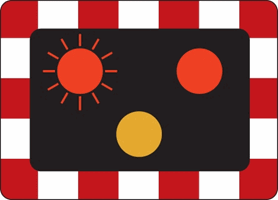
B
C
D
Correct Answer: A
Explanation: At a level crossing flashing red lights mean you must stop. If the train passes but the lights keep flashing, wait. There may be another train coming.
Explanation: At a level crossing flashing red lights mean you must stop. If the train passes but the lights keep flashing, wait. There may be another train coming.
Correct Answer: A
Explanation: If you can't see all around your vehicle get out and have a look. You could also ask someone reliable outside the vehicle to guide you. A small child could easily be hidden directly behind you. Don't take risks.
Explanation: If you can't see all around your vehicle get out and have a look. You could also ask someone reliable outside the vehicle to guide you. A small child could easily be hidden directly behind you. Don't take risks.
39. You are driving along a wet road. How can you tell if your vehicle is aquaplaning?
Mark one answer
B
C
D
Correct Answer: D
Explanation: If you drive at speed in very wet conditions your steering may suddenly feel 'light'. This means that the tyres have lifted off the surface of the road and are skating on the surface of the water. This is known as aquaplaning. Reduce speed by easing off the accelerator, but don't brake until your steering returns to normal.
Explanation: If you drive at speed in very wet conditions your steering may suddenly feel 'light'. This means that the tyres have lifted off the surface of the road and are skating on the surface of the water. This is known as aquaplaning. Reduce speed by easing off the accelerator, but don't brake until your steering returns to normal.
40. Your vehicle has broken down on a motorway. You are not able to stop on the hard shoulder. What should you do?
Mark one answer
B
C
D
Correct Answer: D
Explanation: If you can't get your vehicle onto the hard shoulder, use your hazard warning lights to warn others. Leave your vehicle only when you can safely get clear of the carriageway. Do not try to repair the vehicle or attempt to place any warning device on the carriageway.
Explanation: If you can't get your vehicle onto the hard shoulder, use your hazard warning lights to warn others. Leave your vehicle only when you can safely get clear of the carriageway. Do not try to repair the vehicle or attempt to place any warning device on the carriageway.
Correct Answer: C, E
Explanation: Harsh braking, constant gear changes and harsh acceleration increase fuel consumption. An engine uses less fuel when travelling at a constant low speed. You need to look well ahead so you are able to anticipate hazards early. Easing off the accelerator and timing your approach, at junctions, for example, could actually improve the fuel consumption of your vehicle.
Explanation: Harsh braking, constant gear changes and harsh acceleration increase fuel consumption. An engine uses less fuel when travelling at a constant low speed. You need to look well ahead so you are able to anticipate hazards early. Easing off the accelerator and timing your approach, at junctions, for example, could actually improve the fuel consumption of your vehicle.
42. You are intending to leave the motorway at the next exit. Before you reach the exit you should normally position your vehicle
Mark one answer
B
C
D
Correct Answer: B
Explanation: You'll see the first advance direction sign one mile from the exit. If you're travelling at 60 mph in the right-hand lane you'll only have about 50 seconds before you reach the countdown markers. There will be another sign at the half-mile point. Move in to the left-hand lane in good time. Don't cut across traffic at the last moment and don't risk missing your exit.
Explanation: You'll see the first advance direction sign one mile from the exit. If you're travelling at 60 mph in the right-hand lane you'll only have about 50 seconds before you reach the countdown markers. There will be another sign at the half-mile point. Move in to the left-hand lane in good time. Don't cut across traffic at the last moment and don't risk missing your exit.
43. You are driving in busy traffic. You want to pull up on the left just after a junction on the left. When should you signal?
Mark one answer
B
C
D
Correct Answer: A
Explanation: You need to signal to let other drivers know your intentions. However, if you indicate too early they may think you are turning left into the junction. Correct timing of the signal is very important to avoid misleading others.
Explanation: You need to signal to let other drivers know your intentions. However, if you indicate too early they may think you are turning left into the junction. Correct timing of the signal is very important to avoid misleading others.
Correct Answer: A
Explanation: If you want to turn your car around try to find a place where you have good all-round vision. If this isn't possible and you're unable to see clearly, then get someone to guide you.
Explanation: If you want to turn your car around try to find a place where you have good all-round vision. If this isn't possible and you're unable to see clearly, then get someone to guide you.
45. You are on a fast, open road in good conditions. For safety, the distance between you and the vehicle in front should be
Mark one answer

B
C
D
Correct Answer: B
Explanation: One useful method of checking that you've allowed enough room between you and the vehicle in front is the two-second rule.To check for a two-second time gap, choose a stationary object ahead, such as a bridge or road sign. When the car in front passes the object say 'Only a fool breaks the two-second rule'. If you reach the object before you finish saying it you're too close.
Explanation: One useful method of checking that you've allowed enough room between you and the vehicle in front is the two-second rule.To check for a two-second time gap, choose a stationary object ahead, such as a bridge or road sign. When the car in front passes the object say 'Only a fool breaks the two-second rule'. If you reach the object before you finish saying it you're too close.
Correct Answer: D
Explanation: A broken-down vehicle in a tunnel can cause serious congestion and danger to other road users. If your vehicle breaks down, get help without delay. Switch on your hazard warning lights, then go to an emergency telephone point to call for help.
Explanation: A broken-down vehicle in a tunnel can cause serious congestion and danger to other road users. If your vehicle breaks down, get help without delay. Switch on your hazard warning lights, then go to an emergency telephone point to call for help.
Correct Answer: A
Explanation: It is not always necessary to change up or down through each gear. Missing out intermediate gears helps to reduce the amount of time you are accelerating. Because fuel consumption is at its highest when accelerating this can save fuel.
Explanation: It is not always necessary to change up or down through each gear. Missing out intermediate gears helps to reduce the amount of time you are accelerating. Because fuel consumption is at its highest when accelerating this can save fuel.
Correct Answer: D
Explanation: The Pass Plus scheme was created for newly qualified drivers. It aims to widen their driving experience and improve basic skills. After passing the practical driving test additional professional training can be taken with an Approved Driving Instructor (ADI). Some insurance companies also offer discounts to holders of a Pass Plus certificate.
Explanation: The Pass Plus scheme was created for newly qualified drivers. It aims to widen their driving experience and improve basic skills. After passing the practical driving test additional professional training can be taken with an Approved Driving Instructor (ADI). Some insurance companies also offer discounts to holders of a Pass Plus certificate.
B
C
D
Correct Answer: A
Explanation: It is your responsibility as a driver to ensure that children are secure and safe in your vehicle. Make sure you are familiar with the rules. In a few very exceptional cases when a child restraint is not available, an adult seat belt MUST be used. Child restraints and seat belts save lives!
Explanation: It is your responsibility as a driver to ensure that children are secure and safe in your vehicle. Make sure you are familiar with the rules. In a few very exceptional cases when a child restraint is not available, an adult seat belt MUST be used. Child restraints and seat belts save lives!
Correct Answer: A
Explanation: When you take out motor insurance you'll be issued with a certificate. This contains details explaining who and what is insured. If a police officer asks to see your insurance certificate you must produce it at the time or at a police station within a specified period. You also need to have current valid insurance when renewing your vehicle excise duty (road tax).
Explanation: When you take out motor insurance you'll be issued with a certificate. This contains details explaining who and what is insured. If a police officer asks to see your insurance certificate you must produce it at the time or at a police station within a specified period. You also need to have current valid insurance when renewing your vehicle excise duty (road tax).



